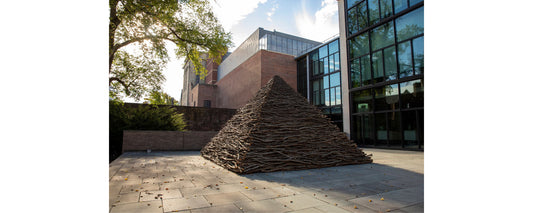Three years after Sandy Hook, with many hundreds of multiple-victim shootings since, congressional gridlock on gun control seems as intractable as ever. But a different “con-”—CONECT, or Congregations Organized for a New Connecticut—sees another route to change, one that needn’t run through Capitol Hill.
Founded in 2011 and based in New Haven, CONECT is a racially diverse, multi-faith network of 25 congregations stretching from East Haven to Norwalk. CONECT itself is part of a much larger network of faith- and community-based organizations called the Metro Industrial Areas Foundation, or Metro IAF, which is part of a still-larger organization, the Industrial Areas Foundation. From top to bottom, or maybe bottom to top, the idea is to achieve positive social change by organizing and mobilizing communities.
sponsored by
At the time of its founding, CONECT’s platform didn’t include gun control. Among its various fronts of activism were efforts aimed at moderating hikes in healthcare insurance premiums and advocating for driver’s licenses for undocumented immigrants, among other concerns voiced by the congregations that make up CONECT. Then, the Newtown school shooting happened, prompting some of CONECT’s members to propose that the group address the underlying issue.
All agreed that the shooting was a reprehensible tragedy, but not everyone agreed on the appropriate way to respond. Some wanted to begin working on gun control issues immediately. Others weren’t so enthused with the sudden zeal.
CONECT’s lead organizer Matt McDermott remembers one black faith leader’s remark: “‘When you talk about Sandy Hook in my congregation, what people hear is race.’” What she meant, as McDermott explains it, was that “kids have been getting killed in New Haven and Bridgeport and cities around the country for years and years and years, and that’s not made headlines for the most part, that’s not outraged us for the most part, that’s not forced us to start a new campaign.” There was a sense of incongruity that because the victims were primarily white and suburban, suddenly faith leaders should “drop everything,” turn from their other campaigns and immediately address gun control.
McDermott was worried these differing stances would devolve into a heated, contentious division within the organization. But although it took CONECT the better part of a year and many “hard conversations” to take up the issue, McDermott says that time helped build stronger solidarity between the coalition’s diverse member congregations, leading to a consensus that whatever plan of action they developed should not only address mass shootings but also the regular drumbeat of gun violence in cities.
With this in mind, CONECT helped form Metro IAF’s gun control campaign. Dubbed “Do Not Stand Idly By”—a phrase pulled from a verse in Leviticus, the rest of which reads, “while your neighbor’s blood is shed”—and launched in early 2014, the first component of the campaign focuses on addressing “bad apple” gun stores. According to the federal Bureau of Alcohol, Tobacco, Firearms and Explosives (ATF), approximately 57% of the firearms involved in crimes trace back to 1% of the nation’s gun stores. The campaign wants manufacturers to act as responsible gatekeepers and police their own distribution networks in order to stop supplying the bad apples.
The campaign’s second component pushes manufacturers to produce “smart guns,” incorporating modern technology to increase weapon safety. Fingerprint sensors, for instance, are now a common security feature on many smartphones. But while a fingerprint sensor on a phone may be good for keeping snooping eyes from your texts or photos, such a sensor on a household gun could be the thing that keeps a teen from completing a suicide attempt, a police officer from being killed with their own weapon or a child from accidentally shooting a brother, sister or friend.
As of this writing, the campaign has the endorsements of 82 different jurisdictions at the town, city, county and state levels. Recently, the campaign reached a much higher jurisdiction: Barack Obama’s. In December, CONECT and Metro IAF leaders met with officials from the Justice Department and the ATF. Obama incorporated the smart-gun component of “Do Not Stand Idly By” as part of his executive action on gun control and directed the department of Defense, Homeland Security and Justice to conduct or sponsor research into gun safety technology, and to assess the possibility of procuring such weapons for federal law enforcement. Since the federal government is the gun industry’s single-largest customer, it could be a game-changer.
Of course, legislative change would make for a broader fix. While recent polls strongly suggest the American public favors at least some tightening of America’s gun laws, the public’s will is rarely enacted without pressure powerful enough to overcome entrenched and narrow special interests of groups like the National Rifle Association.
One of the keys to building that pressure, McDermott says, and something he says he finds himself doing a fair bit, is to de-stigmatize the notion of power in the minds of community activists and leaders. “There’s a lot of connotation in our culture about power being a dirty thing, a bad thing, a corrupting thing.” But “power can be used for good or bad,” he says. “You want to change the world? Make things happen? Improve things? For that, you need power.”
CONECT
185 Cold Spring St, New Haven (map)
(203) 787-1090
www.weconect.org
Written and photographed by Daniel Shkolnik. From left to right, image depicts Matt McDermott (CONECT), Timothy Jones (Community Baptist Church, New Haven) and Anne Watkins (Congregation B’nai Israel, Bridgeport).








